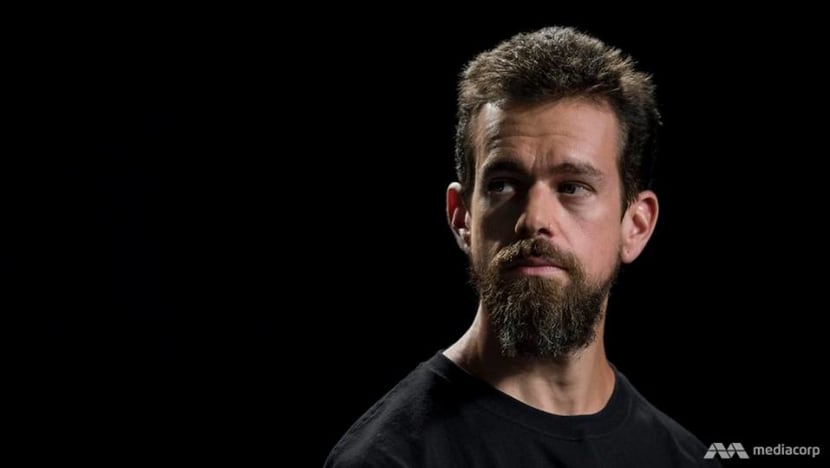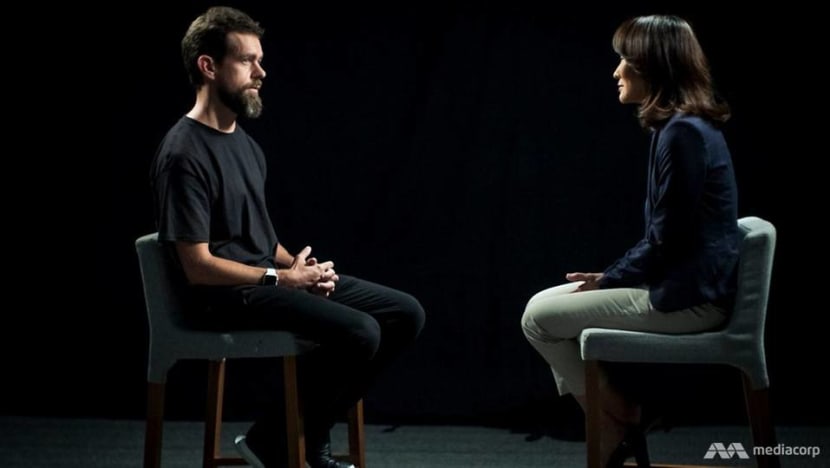Twitter will exist for a thousand years, says CEO Jack Dorsey
Sitting down with Conversation With’s Lin Xueling, Mr Dorsey chats fighting Twitter bots, taking action on widely followed personalities and operating the platform in non-English-speaking markets.

Twitter CEO Jack Dorsey shares how the social media platform is grappling with issues like bots, fake news and hate speech during his one-on-one interview on Conversation With. (Photo: Lin Xueling/Twitter)
SAN FRANCISCO: Will Twitter exist for another 20 years? “I think it will exist for a thousand years,” the social media giant’s CEO Jack Dorsey replied.
The 41-year-old multimillionaire was decked out in quintessential tech start-up gear - Round-necked tee, dark jeans, sneakers - as he spoke with Conversation With’s Lin Xueling during an interview at Twitter’s headquarters.
And he wasn’t shy to point out why the platform he co-created in 2006, allowing people to send out 140-character (now 280) messages into the World Wide Web, will be around long after he isn’t.
After all, Twitter is considered by many as the modern-day equivalent of a digital water cooler where people can share the latest news and updates about their lives and others. It is also the platform of choice for world leaders like US President Donald Trump and India’s Narendra Modi to put out their messages to anyone who wants to listen.
On the platform’s longevity, Mr Dorsey explained: “(Twitter) will take on a different format of course, because technology changes, but I think it has reached something really fundamental, which is conversation.
“The intention when we started it was just to have a conversation in public with each other and share what was happening with us.
“And the people who started using it more and more showed that it was relevant to them, and they wanted to have conversations out in the open, in the world, and I think it hit a nerve that is really foundational. I think that is what persisted.”
As of the second quarter of this year, the platform has about 335 million monthly active users (MAUs) worldwide, representing a 3 per cent year-on-year increase from the 326 million it clocked in the same period last year. Of these, only 68 million are from the United States while international users make up the rest.
Twitter’s popularity with users outside of its US base is apparent, yet question marks remain whether it is equipped to operate in non-English-speaking markets and if it is able to detect and deal with things like hate speech in a local context.
Mr Dorsey said his team makes sure Twitter is accessible to everyone, and there are translators hired from the community to look at translations.
As for dealing with hate speech that may not be in English, the CEO said there are different teams around the world paying attention to local laws. “If there are hate speech laws, for instance, then we may have to act on that particular content.”
He added that employees are trained for what is contextually relevant in certain cultures, and what are the local laws, and apply their judgements based on these factors.
“Could we always use more training? Could we always use more local people and resources? Absolutely,” Mr Dorsey said. “We need to figure out how to scale these things.
“With the resources we have, we are trying to work as quickly as possible to fill in any particular gaps, but at the same time, we need to prioritise as well.”
TAKING ACTION AGAINST HIGH-POWERED PROFILES
Even as Twitter grapples with these issues, there have also been calls for it to play a more active role in curating the kinds of personalities allowed on the platform.
Specifically, questions have been asked about what actions would Twitter take if a well-followed account - for example US President Trump’s - is deemed to have consistently violated the platform’s terms of service.
Mr Dorsey said: “Every single account is judged by our terms of service. So we take action on it. Period.”
As for world leaders, the CEO said its belief is that it is important for people to hear from their world leaders directly and “if we can be a public vehicle for that, great”.
“They’re going to say some things that people disagree with on our platform, and some things that people disagree with on channels like yours, and we want to make sure that we are showing the public record of what we have said, but more importantly, the discussion rendered,” he elaborated.
“We have had a very rich history of people speaking truth to power and, if we removed that, then that ability to have a conversation also potentially goes away.”
Mr Dorsey did point out that, contrary to what some may think, the company is not actively retaining these popular accounts simply because of the number of followers they have.
“We’ve suspended accounts that have lots and lots of followers,” he said, declining to name an example.
Will Twitter take down an account even if it had millions of followers?
“If they violate the rules, absolutely,” Mr Dorsey said.
Even if such actions affect the company’s bottomline?
“Well, we think about the bottomline but not in regards to forcing our actions,” the Twitter chief said. “We want to make sure that we have clear terms of service out there and we enforce them.
“Sometimes the enforcement is a permanent suspension. That’s the extreme. Sometimes it’s a warning, sometimes it’s ... a particular action on tweets that violated our terms of service.
“Our revenue and bottomline never carries into enforcement procedures,” Mr Dorsey reiterated.
This issue is squarely in the spotlight currently, after Twitter declined to follow other tech companies like Apple, YouTube, Facebook and Spotify in removing InfoWars' creator Alex Jones, considered by some as a far-right conspiracy theorist, from its platform.
Mr Dorsey, in tweets made on Aug 8, explained the decision saying: "We didn't suspend Alex Jones or Infowars yesterday. We know that's hard for many but the reason is simple: He hasn't violated our rules. We'll enforce if he does."
He added that Twitter is going to hold Mr Jones to "the same standard we hold to every account, not taking one-off actions to make us feel good in the short term and adding fuel to new conspiracy theories".
However, his explanation has not gone down well with many.
France's Secretary of State for Digital Affairs Mounir Mahjoubi, for one, tweeted at Mr Dorsey saying: "Dear @jack, you said Twitter rules are a living document, then please consider that you can't be the only creator of these Tables of the Rule."
HAVING A BALANCED CONVERSATION
Twitter has largely avoided the public backlash that the other social media behemoth, Facebook, is facing regarding its role in the political arena, specifically the 2016 US Presidential elections.
Its role in people’s conversations and debates around these political events is not in doubt though.
For instance, a Twitter blog post in January this year said the company had notified approximately 1.4 million people who may have directly engaged with accounts linked with the Russia-linked organisation Internet Research Agency (IRA), or had followed one of these accounts. The IRA is reported to have hired trolls to post false news and divisive content on social media platforms, including Twitter.
Asked if the social media giant needs to take a proactive role in making sure any political debate on its platform is a balanced one, Mr Dorsey said “it will be very hard” for it to balance the conversation.
“It doesn’t mean that we shouldn’t help people by giving them tools to find that balance themselves and that’s our attention,” he went on to add.
“I think the more that we can work through our algorithms and through humans to give people better tools to find a balance or to recognise misinformation or to understand credibility within each other or particular accounts, (the better).”
The CEO likened its efforts to measuring conversations based on whether it is “healthy” or not.
He said: “We have an indicator of health, which is your temperature, and sometimes that temperature may be too high, sometimes it might be too low.
“When this happens, it indicates your system is out of balance in some way and, understanding that, we can understand the spectrum of solutions that might help you.”
Beyond giving tools to help give people the context to try and bring the debate back into a “healthy, civic dialogue” on events like an election, Twitter is also keen to measure if such tools are actually helping or hurting the effort.

BATTLING THE BOTS
But what of automated, or “zombie”, Twitter accounts that are used to spread misinformation?
Mr Dorsey acknowledged that the clean-up operations the platform recently embarked on are “actions that we could have and should have taken some time ago”.
“It’s taken us some time to really understand the dynamics of what is going on and make sure that we’re in a place where we can do this and (I’m) happy to state that we are because we have a better understanding of the system and how these work.”
Twitter said at the end of July it lost 1 million monthly active users from the previous quarter and warned this number could grow even as it deletes more fake accounts as part of its decision to prioritise tackling suspicious accounts and reducing hate speech and other abusive content.
“I think any time we take actions like this, we are improving the health of the overall conversation because you’re not having to guess about what’s real and what’s not, what’s meant to game a system,” the CEO said.
He revealed that every week, Twitter challenges eight million accounts to see if these are bots or not.
This, he added, shows the company has been “fairly aggressive” in its efforts and, while it is a process, it had to start some where and it has made some “big moves in the short term”.
“I wouldn’t call them marginal by any means, but they were the right thing to do based on everything that we were seeing and we will continue to do so.”
In the end, these efforts all boil down to what Mr Dorsey mentioned at the start: “I think (Twitter) is the place for public conversation and we want to be the best place for (such) public conversation.”
Catch the full interview with Jack Dorsey on Conversation With on Aug 23 at 9:30pm (Singapore time).













